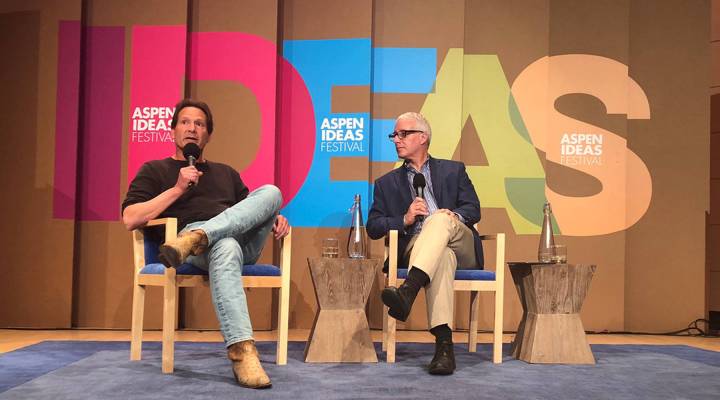
The CEO of PayPal: Managing and moving money shouldn’t be a privilege of the affluent
The CEO of PayPal: Managing and moving money shouldn’t be a privilege of the affluent

Top executives, policymakers and artists gather at the Aspen Ideas Festival every year to share their expertise with the public. This year, the focus is on globalization, free speech and how we’re adapting to an increasingly technical world. Marketplace is at Aspen focusing on what those experts are saying about the future. What’s next for the Trump administration’s antitrust efforts? Or the potential for a world without credit cards? Check out the full series here.
To understand more about the way our country’s financial services operate, the CEO of PayPal went undercover to cash-checking places and money order centers.
Why? Dan Schulman, the head of that $100 billion online payments company, wants to help make a difference for underserved segments of our population and improve their “financial health.”
At this year’s Aspen Ideas Festival, Schulman talked to Marketplace’s David Brancaccio about how we might eventually be able to create a revolution in the way we think about financial services, whether we’ll eventually move away from credit cards, and how millennials think about money issues. Below is an edited transcript of their conversation. We first asked him about some of the locations he went undercover.
David Brancaccio: Where’d you go, what’d you do?
Dan Schulman: So I was in New York City. I went to cash-checking places, I went to pay my cable bill. I actually paid it at Time Warner. I waited in line for that. I went to a money order center. I went to a Western Union. By the way, at a Western Union, you have to give like a password that the other side can give. And of course, my daughter forgot it, so I had to go back and stand in line to do it again. You don’t think about these things, but the small inconveniences, the ability to be a productive citizen — if you’re underserved or outside of the financial system, it’s very, very difficult.
Brancaccio: And you encourage your PayPal team, your employees, to try this to?
Schulman: Actually, it’s a requirement for us. I think, managing and moving money should be a right for every citizen. It just shouldn’t be a privilege of the affluent. And we’re in a very fortunate position, PayPal, in that we use technology in a way that can make basic transactions easier to do, more accessible. And really you are doing those transactions right from the palm of your hand, on your smartphone. We can do it at a 50 to 80 percent less cost. And so think about that — if there’s $170 billion being spent today, if we could even return 10 percent of that, maybe 20 percent of that, to those who most need it, that’s tens of billions of dollars that you could return to the population that, today is, for the most part, excluded from the opportunities of the digital economy, who rail against the system. They’re not voting one way or another, just voting against the system because they feel the system has let them down. And in many ways, it has. So we really need to step up as companies.
Brancaccio: You’re actually connecting this, Dan, to the big story of our age — which is the polarization of politics in America. Some of it’s driven, you just argued, economic insecurity.
Schulman: Oh, I’d absolutely argue that. My favorite quote of democracy is that democracy needs to be more than two wolves and a sheep voting on what to have for dinner. So think about that. That means we have to rise above our own self-interest for democracy to flourish. But how do you expect people to rise above their own self-interests, when they’re struggling to make ends meet? And so I think if we can help to establish at least some level of financial health, saving them money on transactions, saving them time, allowing small businesses to get working capital where people won’t loan to them, I think if you can start to make a difference, one at a time, maybe that starts an evolution and maybe eventually a revolution in the way we think about financial services.
Brancaccio: So we’ve been talking about the incredibly vulnerable position of so many people in America when it comes to their finances. Many don’t even have bank accounts for starts. It’s almost like a financial illness. But you’ve also done some thinking about, really, financial health. In other words, it’s almost like a wellness proposition. I think there’s a suggestion that’s where you’re going next with this.
Schulman: But there used to be a movement inside financial institutions to drive towards something that people define as financial inclusion. And the definition of financial inclusion was giving you a bank account. But a bank account, if it’s dormant, does no good to you.
Brancaccio: You’ll get dinged with fees, for starters.
Schulman: You might get dinged with fees. But if you don’t and you don’t use it — it’s not a measure of financial health. A measure of financial health, to me, is what is your financial literacy, what is your savings amount, how can we incent savings, do you have a budget that enables you to think about not just the here and now, but things you want to spend on in the future. And I think that software and technology can make that easier for somebody. If you’ve ever tried to keep a budget, it’s almost possible. You’ve got to write down every expense, and then you’ve got to tally it and think about it. But imagine if software could categorize that for you immediately, and tell you, “Wait, you’re hitting the limit of what you wanted to spend on entertainment this month, and you’re falling short of that goal of saving for holiday presents that you wanted to go and do.” And so I think that there are just ways that we can enable through technology — it’s not the sole solution, by the way, and I’m not saying that it is, but it is part of the answer that can help to drive to financial health. And I think thinking about things in terms of financial health is a much more robust and much more profound way of thinking about how we help underserved segments to find financial inclusion.
Brancaccio: But your work can fit in where banks have fallen down. But you don’t want to be a bank? I think your COO was quoted as saying, ‘We’re not a bank. PayPal’s not a bank.”
Schulman: We aren’t. We’re very different. We’re not trying to think about what was, but really trying to imagine what could be. Because I think so much of the financial services industry is going to change over the next five years. I think you’re going to see more change over the next five, maybe 10 years than you saw in the last 25 to 50 years. And so I think for different segments of the population — this is very important — for the underserved segment, there’s ways of serving them that have never been imagined before. For the affluent segments of the population, we partner with the financial institutions, with the largest banks, with the networks to take the best of our assets and the best of their assets and create value propositions that maybe neither of us could’ve done alone. And so I think you need to think about servicing this market — not on average, because when you do things on average, you don’t really have a value proposition that resonates to anybody. But think about the market, segment by segment and then figure out how do you best serve those parts of the population. But the heart and soul of PayPal is these underserved markets and small businesses, and that’s where we’re focusing our energy to try and democratize access to the digital economy.
Brancaccio: Would you like to see us get to the point where we don’t use credit cards?
Schulman: I think we’re going to have credit cards and cash around for a long time. But I think it’s inevitable as you think into the future. And let’s take time out of the equation, because people really debate this around time, but say 20, 25 years from now, you have the explosion of mobile phones, you have the digitization of money. The funding mechanism — it could be credit that funds your digital wallet, it may be an account of some kind, but the physical manifestation of how you pay will increasingly move to mobile phones or other devices.
Brancaccio: PayPal also owns Venmo. I worry about Venmo for you because doesn’t Venmo rob some of your PayPal business?
Schulman: Venmo is a part of PayPal, so you shouldn’t worry about it. I think we couldn’t be more pleased with the popularity and the growth of Venmo. Venmo really is now a sort of beloved way that the millennial generation manages and moves their money. And so to me — this is part of the segmentation conversation that we were having — millennials think about their public and private persona differently. They think about their money differently. But interestingly, young people, maybe it’s because we’re coming on the 10th anniversary of the Great Recession, they saw their parents go through this, they think very hard about their financial health. They think very hard about making sure that they have savings. So it’s counterintuitive to what some people might think about younger adults. You know, they spend and they’re just about entertainment. It isn’t that way. They really want a way of understanding how they can manage and move their money in an era of mobile and digital commerce. But also, how do we save? How do we enable that for them?
Brancaccio: It was my understanding that you would make more off of PayPal transactions. If they’re doing it on Venmo, maybe you’re leaving some money on the table, no?
Sculman: No. If you want to think of the best metaphor for Venmo, it’s PayPal. PayPal started off as a peer-to-peer service, which Venmo started off at. And then we started enabling those customers to be able to make purchases at merchants. So giving them more functionality. We’re doing the exact same thing with Venmo right now. We’re trying to do it within the spirit of that value proposition — allow somebody to make a transaction at a merchant, but split it amongst their friends. Because a lot of that is what’s happening in the millennial generation. So we’ll monetize Venmo exactly the way it happened with PayPal, but two very different value propositions for two different segments of the market.
There’s a lot happening in the world. Through it all, Marketplace is here for you.
You rely on Marketplace to break down the world’s events and tell you how it affects you in a fact-based, approachable way. We rely on your financial support to keep making that possible.
Your donation today powers the independent journalism that you rely on. For just $5/month, you can help sustain Marketplace so we can keep reporting on the things that matter to you.


















